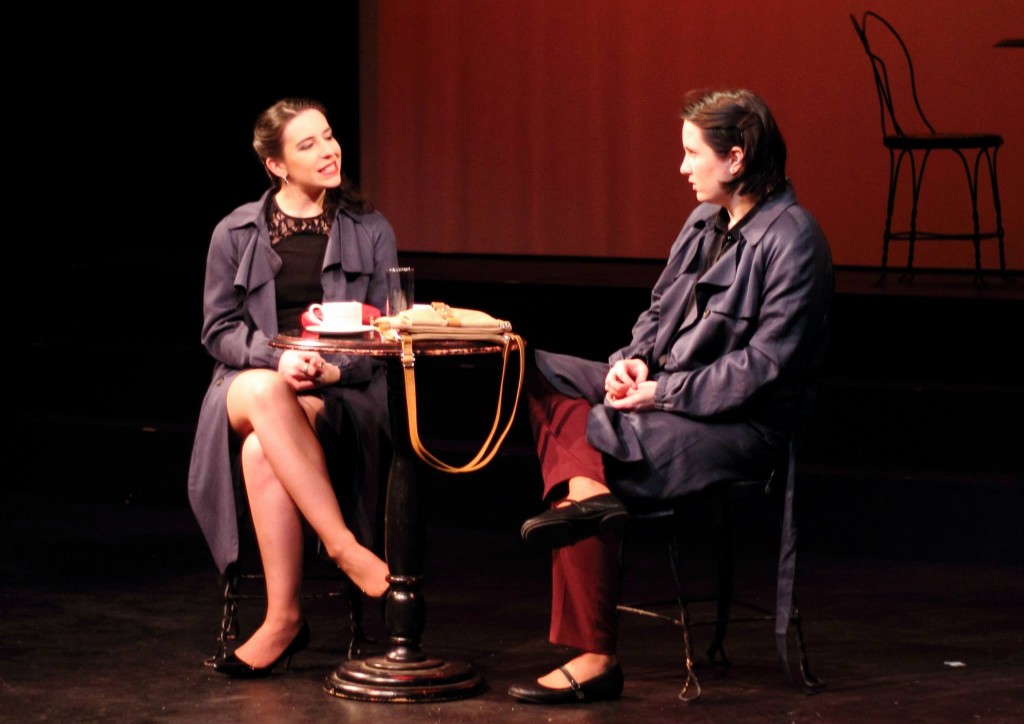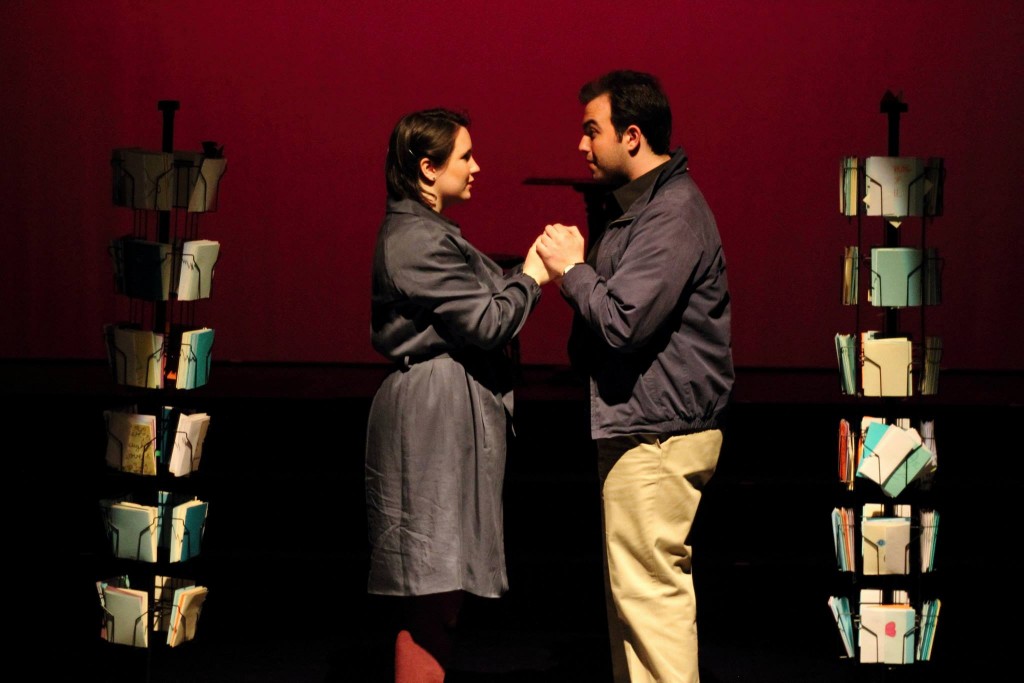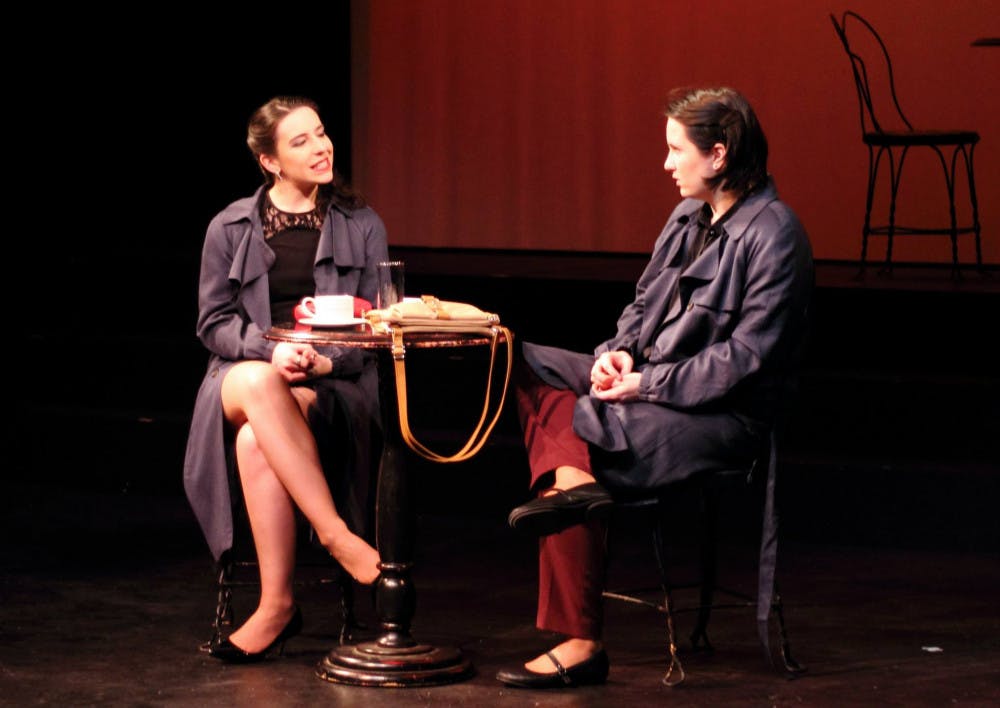By Ellie Schuckman
Opinions Editor
Set on the verge of the modern smartphone revolution, All College Theater’s interpretation of “Dead Man’s Cell Phone” had audience members questioning metaphysics their own use of electronics throughout its five performances last week in the Don Evans Black Box Theater.
The play, detailing one introvert’s journey as she tries to form relationships with others, explores modern technology’s ability to both isolate and unite people together.
With white, circular lanterns hanging from the ceiling and soft blue and purple lighting, audience members were immersed into the theater from the instant they entered. Instrumental music from jazz to Debussey (designed by Glenn Nunez Rodriguez and Sorraya Brashear-Evans) added yet another layer to the story, driving it forward.

Senior music major Shannon McGovern kicked off the show with her quirky interpretation of Jean, a woman in her late thirties who picks up the cellphone of a man (later revealed to be Gordon) in a cafe to stop it from ringing — that is, to stop it from bothering her work. Unbeknownst to Jean, the man is dead, sending the play into motion.
McGovern brought Jean to life, engaging the audience while raising awareness to the dangers we so commonly ignore.
Junior philosophy major Nick Muoio dominated the stage as Gordon with a fierce voice and charisma, enlivening the crowd. Commanding his lines and a lengthy monologue, Muoio divulged the narcissistic and truly troubled man his character is while playing him with style. He even invited the audience into his performance, his gestures and forceful eye contact roping them in.
Freshman communication studies major Lauren Vogel further livened the show with her performance as Gordon’s mother, Mrs. Gottlieb, a difficult, complex woman trying to cope with the loss of her beloved son.
“It was a lot fun getting to work with a small cast as you really get to know everyone,” Vogel said. “Being 19, it was kind of difficult to find the character of a 65-year-old woman — it was a challenge to get into that mindset. We all played characters that were well above our age.”

Written by esteemed playwright Sarah Ruhl, the story begs the question: Can people truly connect to one another in a world dominated by technology, where each individual has their eyes constantly locked on artificial screens?
Professional director Noah Herman offered an aesthetically compelling interpretation of the play. As the story itself has a message prevalent to modern society — the lack of communication with others in a society obsessed with cellphones — it only makes sense to push that message a bit further through sound, color and the moods these effects establish.
Adding to the “real-world” feel of the play, lighting (designed expertly by Jen Dall, Liz Farrell and Kim Bernstein) played a significant role, changing the mood of each scene. While the story itself has abstract qualities, lighting and sound cues are used to draw the audience into the show. Even when the text of the show begins to get confusing, the strong aesthetic choices of the director and the production staff help to communicate the show’s overall theme.
The tones of a cellphone, for example, rang throughout the play, signifying a change in Jean’s character as she becomes more withdrawn from those immediately around her and obsessed with who is on the other end of the phone calls.
“Through the imagination of the play, and especially through Gordon’s cell phone, (Jean) gains a little bit of power in her life, and she uses her storytelling, lies and confabulations to create a world that she wants to live in,” McGovern said. “However, it doesn’t necessarily turn out exactly as she thought it would, and that realization changes her for the better.”
The cast also included junior communication studies major Jackie Kuczinski playing Hermia, Gordon’s widow, as she struggles to cope with his death, fearing their relationship was never truly whole. Junior political science major Sam Waxenbaum starred alongside McGovern as Dwight, Gordon’s younger brother who constantly lives in his shadow. Rounding out the group of six actors was junior history and education double major Rachel Friedman, who put on a convincing role as The Other Woman (Gordon’s mistress) and The Stranger.
But not all was seamless. One of the production’s few flaws was perhaps the text of the play itself. While delivering a message important to society, the absurdity in Jean’s lines and actions — continuously answering and cherishing his cell phone while forming rapid relationships with his relatives — is almost too outlandish. That said, the cast did everything it could to embody the characters, create visceral effects and reveal our obsession with electronics, for better or worse.
“Dead Man’s Cell Phone,” with an underlying humor coursing throughout, is simply captivating, with particular thanks to the production staff that pulled off a two-hour, technical feat.
“The show is very abstract and has so many wacky technical elements, but the production staff has done such an excellent job bringing it all together,” McGovern said. “Because of their hard work, the show and story is really able to shine amongst this weird world of falling paper, eerie lighting and a symphony of cell phones.”







